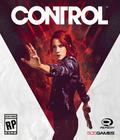Buy Control
If you've never heard of the SCP Foundation, it's a website dedicated to cataloging fictional "objects" that have some surreal (and often dangerous) aspect to them in the form of reports from an overseeing agency, complete with lots of redactions. Control, from Alan Wake's Remedy, basically asks what happens when you take that concept and turn it into a video game. The result is something genuinely exciting and fun, but it's not without its flaws.
Control follows the story of Jesse Faden. Due to a mysterious event in her past, Jesse spends her days tracking down that most elusive of mysteries: the men who cover up supernatural occurrences. Guided by a voice in her head, she tracks them down to the Bureau of Control, the government's elite anti-paranormal unit. Unfortunately, Jesse arrives just in time to get caught in a lockdown as a supernatural force called The Hiss runs rampant throughout the bureau's main base. Upon finding the dead body of the director of the bureau and picking up his shapeshifting gun known as the Service Weapon, Jesse is the new director and must clean up the mess before The Hiss escapes into the world.
Control's narrative is sort of muddled. The basic concept is interesting, and when the game is exploring its side-quests and world, it's really cool and interesting. However, the main plot is rather dull. The Hiss isn't an interesting enemy, coming across as less-interesting versions of the foes in Alan Wake. They're fun to fight, but they're not fun as antagonists, and their story is the least interesting part of the whole affair. Even the ending is unsatisfying and rushed. I was infinitely more engaged with the weird world of Control beyond The Hiss; finding side-quests, data logs and lore ended up being more fun than Jesse's story.
Where the game shines is in its SCP Foundation-inspired weird objects. I wish the game played around with this some more because it's one of the most enjoyable parts. Whether it's a clock that does nothing but make infinite bonus clocks, a teleporting rubber duck, or a fridge you really shouldn't look away from, there are a bunch of neat little objects with their own quirks. The game also features a lot of dark humor, which is more enjoyable than the attempts at spookiness! The game thrives when it's exploring the things the bureau normally handles.
The core gameplay in Control is a standard shooter setup. Your primary method of attack is the service weapon, which is a transforming gun that can take on all the traditional shooter shapes: pistol, shotgun, sniper rifle, machinegun and rocket launcher. You can have two different forms equipped at a time and swap between them freely. However, the weapon shares its ammo between forms. Before you get Deus Ex: Invisible War flashbacks, the service weapon has infinite ammo; it just needs a few moments to recharge. This makes it more of a cooldown to be managed while customizing what you want it to do. I was hesitant at first, but it works very well, largely because it isn't your only combat option.
In addition to the service weapon, you also have a rather large collection of psychic powers, including hypnosis, levitation and telekinesis. Early on, you can't do more than throw some rocks around. As the game progresses, you gain more powerful abilities that drastically increase your ability to fight. The nice thing about powers is that they're all available without having to swap, and they can be used freely without interfering with each other. Telekinesis has an energy bar for attacking and shielding. Seize works on low-health enemies, while Levitation can be used as often as you want, but with a time limit before you start to fall back to the ground. In essence, combat is about managing all of your abilities to make sure you have something to do.
The combat in Control starts off slow and kind of dull. The first couple of areas genuinely drag. As you start getting more options, the game becomes a lot more fun. Shooting enemies is boring. Floating through the sky hurling boulders at everyone around you while forcing your foes to fight on your side? Now, that's fun. By the end of the game, you feel incredibly powerful. You'll be zipping around the battlefield in a nonstop flurry of monster-killing violence and using all of your abilities in a way that feels pretty amazing.
Well… mostly. One potential flaw with the combat is that it's very feast-or-famine. When you die, it will probably be due to getting suddenly bombarded before you can respond. On the other hand, when you kill foes, it tends to be either a slow grind or over in seconds. That is largely because different foes require different combinations of abilities and service weapon types. Some foes are best fought by throwing their own attacks back at them, others by sniping from a distance, others by getting up close and personal. This leads combat to feel really good when you're kicking butt but kind of bad if you have trouble with a tough fight. You respawn at the last control point you unlocked, which can be quite a distance from the fight.
The Hiss are comprised of corrupted humans, and that means they share all of your skills and abilities, but never at the same time. They use guns, psychic powers, or other weapons. Generally, combat involves figuring out the most dangerous foes and taking them out ASAP before you get overwhelmed. The combat is pretty predictable, but the combinations of enemies in conjunction with new powers make it fun.
With that said, Control occasionally deviates from The Hiss, and those moments stand out the most. You'll fight giant monsters and bizarre zombies, and while they're not the most original foes on the planet, they are more interesting than "guys with guns who are glowing." The boss fights are likely to be a sticking point, as they are perhaps the epitome of feast-or-famine. Most of the bosses can deal a ton of damage in a very short period of time. If you're not investing in leveling your health stat, you might even get one-shot, which can involve a trip back to the nearest checkpoint and a five-minute trip back to the boss before you can even again. Once you do figure out the boss's gimmicks, you can take them apart easily, which feels really good.
Perhaps what makes Control stand out from other shooters is that it's designed like a Metroid game more than anything else. Starting early on in the game, you're given nearly free access to the entirety of the Oldest House. Some areas are locked until you find a keycard, power, or other way to proceed. Sometimes, you can access areas early with a bit of trickery, but most plot-locked areas require specific keys to reach.
This means that there are a bucketload of secrets hidden throughout the Oldest House. There are hidden areas that grant bonus items to upgrade your service weapon or powers. There are audio logs and notes aplenty. There are entire optional questlines that can unlock everything, from new powers to costumes to wear. There are even fun environmental puzzles that require you to solve simple puzzles using your surroundings. The vast majority of this is optional. If you follow the story beats, you'll probably explore a small part of the House, especially if you don't return once you have the levitation power. You'll also be missing the most interesting parts of the game.
This is where Control really shines. Finding the weird SCP Foundation items and their backstories and histories, finding out about the wider world, and even some references to Alan Wake scattered here and there. It feels really good to search a hidden nook only to find an entire side-quest you didn't know existed or a powerful upgrade. The only problem with this title is that it's kind of backloaded. The game opens up when you get levitation, which is about halfway through the game. There's a boatload of content, including random calls for help and lengthy side-quests with their own bosses, and it's a lot of fun once you reach that point.
Control has pretty excellent visuals, particularly as it relies on a lot of interesting camera work and visual tricks to create illusions. Some of the facial animation feels a little odd, but by and large, it's a good-looking game. The environments have a lot of nice details, and there are so many hidden secrets that it feels fun to look around and find Easter eggs. The voice acting is also fairly solid, but it took me a while to get used to Jesse's inner monologue, which sometimes sounded a bit too sedated.
Control is a fun follow-up to the sort of weird surreality from Alan Wake without being a direct story sequel. It has distinctive visuals, a dark sense of humor, lots of fourth-wall breaking, and enjoyable combat. If you're looking for a shooter with its own sense of style and a solid amount of content, look no further than Control. Just don't start getting paranoid about why your controller wasn't where you last saw it....
Score: 8.0/10
More articles about Control











 Control (formerly known as P7) is a third-person action-adventure game combining Remedy’s trademark gunplay with supernatural abilities.
Control (formerly known as P7) is a third-person action-adventure game combining Remedy’s trademark gunplay with supernatural abilities.















































